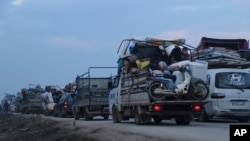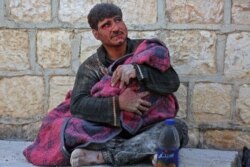The United Nations says conditions are deteriorating at an alarming rate for millions of civilians trapped in Syria's embattled northwest province of Idlib.
Turkey and other countries have closed their borders with Syria, making it virtually impossible for some 3 million civilians in Idlib to escape the violence. Over the past eight months, the United Nations says more than 700,000 people have been forced to flee their homes.
It says 300,000 of them have become displaced since mid-December. That is when Syrian forces and their Russian allies mounted a fierce onslaught to retake Idlib, the last territory still under rebel control.
Spokesman for the U.N. Office for the Coordination of Humanitarian Affairs Jens Laerke says at least 1,300 civilians were killed by airstrikes and shelling between May and August. He says the death toll has certainly risen as airstrikes and shelling are now taking place in many towns and villages on a near-daily basis.
"Every day, we receive disturbing reports of families caught up in the violence, seeking refuge and access to essential services in overcrowded camps and urban areas,” Laerke said. “Many are now sheltering in schools, mosques and other public buildings. Across Idlib, we get reports of critical shortages of food, shelter, health and winterization assistance, as well as other basic services required for their survival."
Laerke said cross-border humanitarian operations mandated by the U.N. Security Council have kept millions of people across Syria alive since 2014. But he notes the resolution remains in force only until Jan. 10.
Laerke told VOA keeping aid flowing into Syria across borders is critically important. He said food, water, medicine and other essential relief is crucial in keeping down the death toll.
"Of course, we cannot prevent shelling and fighting. We can call for that to stop,” Laerke said. “What we can do is that we can provide aid, so that people survive where they are and during this very harsh winter. That is what we are doing. As I mentioned, 2.7 million really rely on our assistance for survival and we need to see that continue."
The U.N. continues to call on the warring parties to take all necessary measures to ensure that civilians are protected. U.N. Secretary-General Antonio Guterres has reiterated his call for an immediate end to the hostilities that have been going on for nearly nine years.
The U.N. chief says the only way to achieve a credible, lasting peace is through a political process. Despite his heartfelt appeal, it appears for now the warring parties are not listening.





